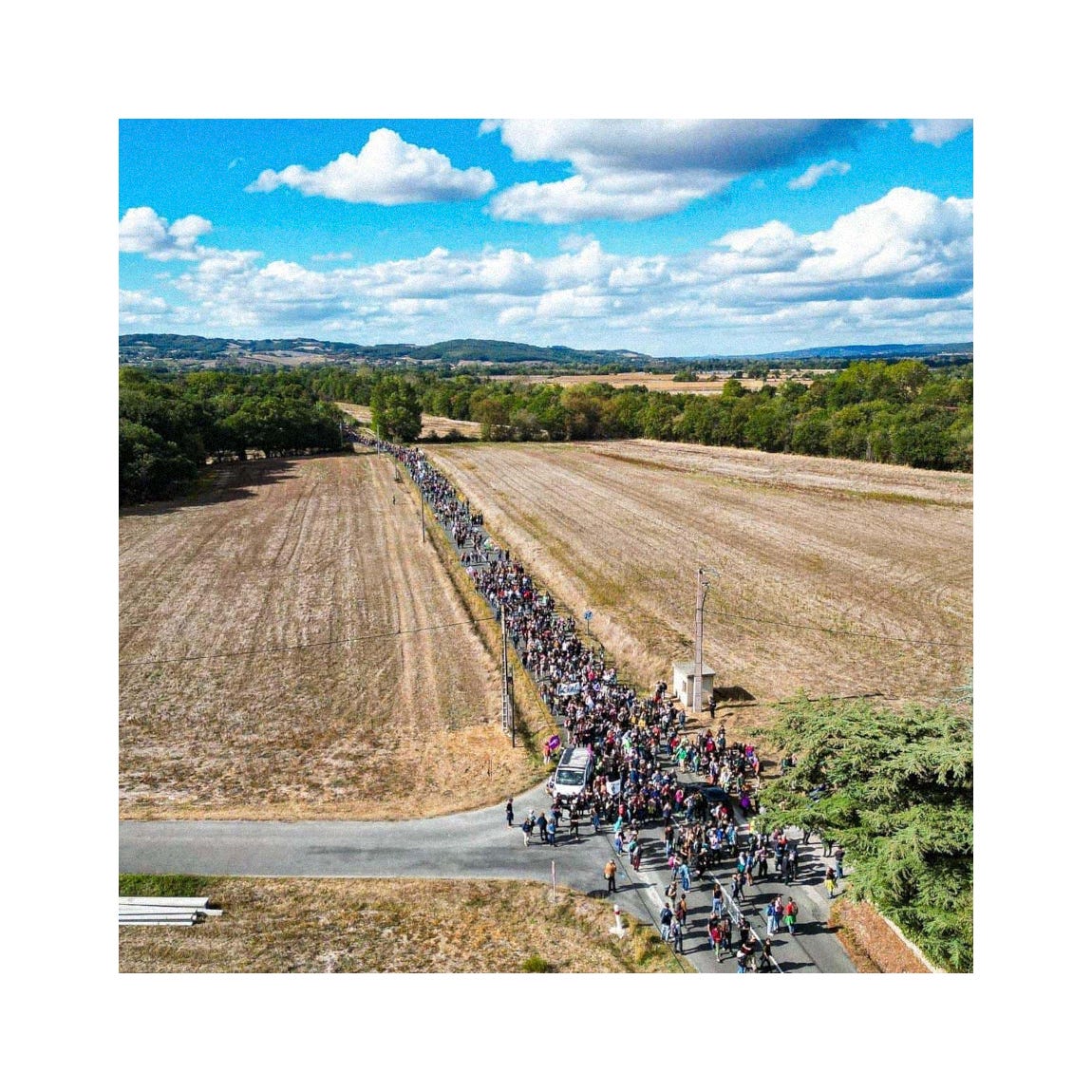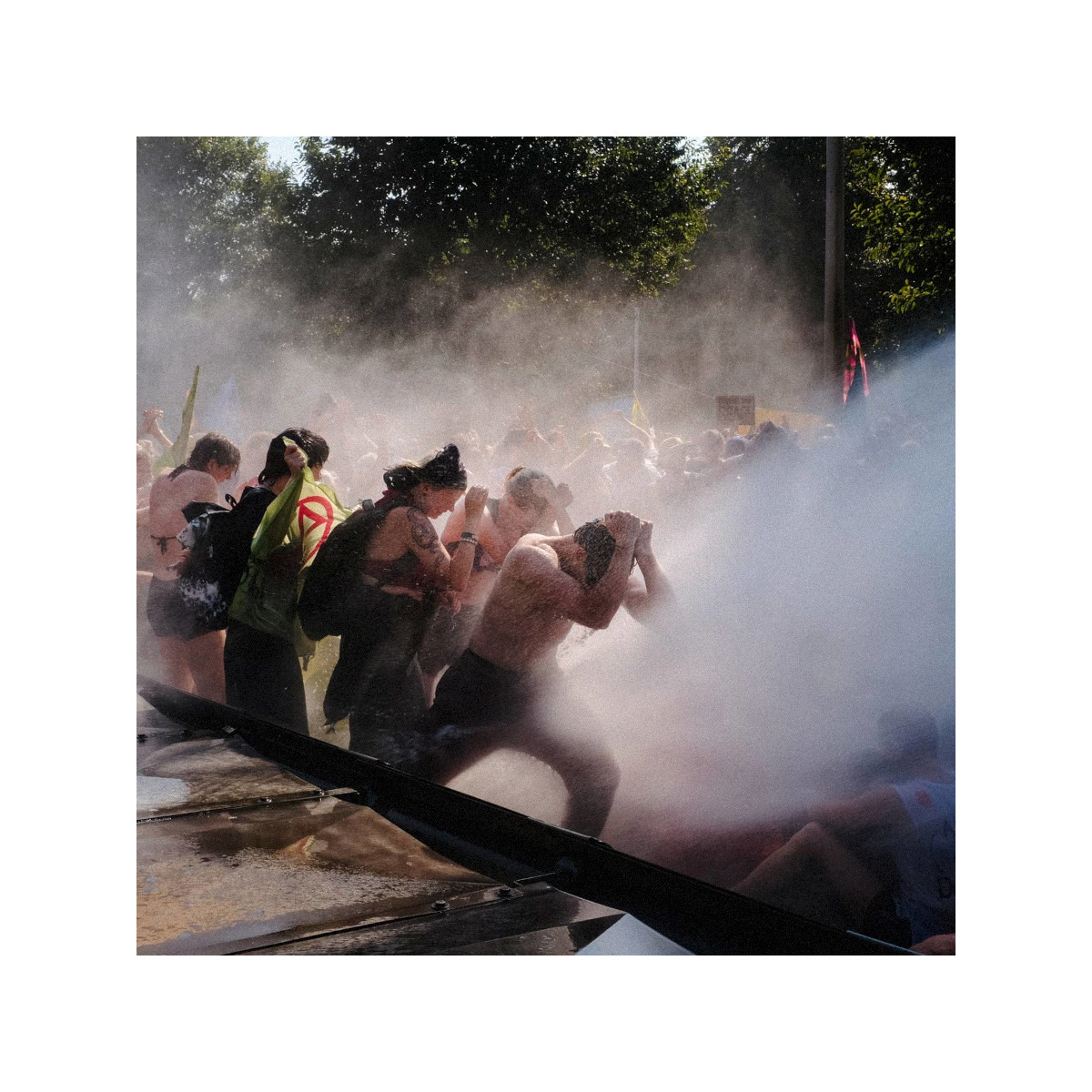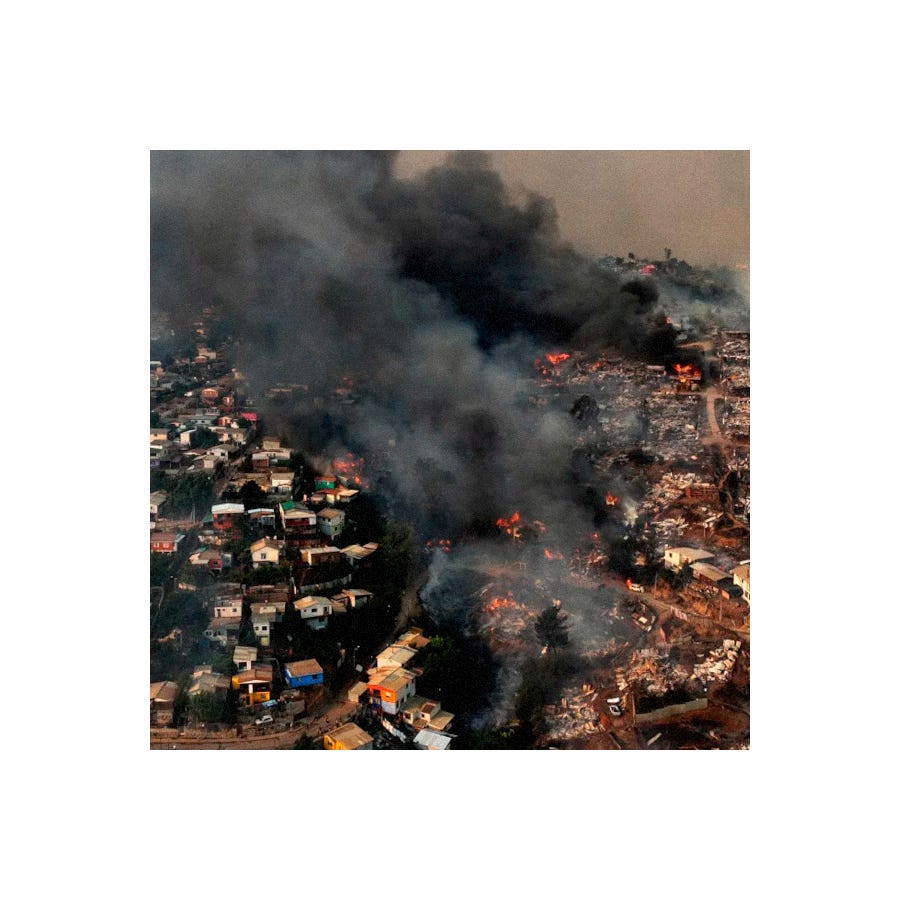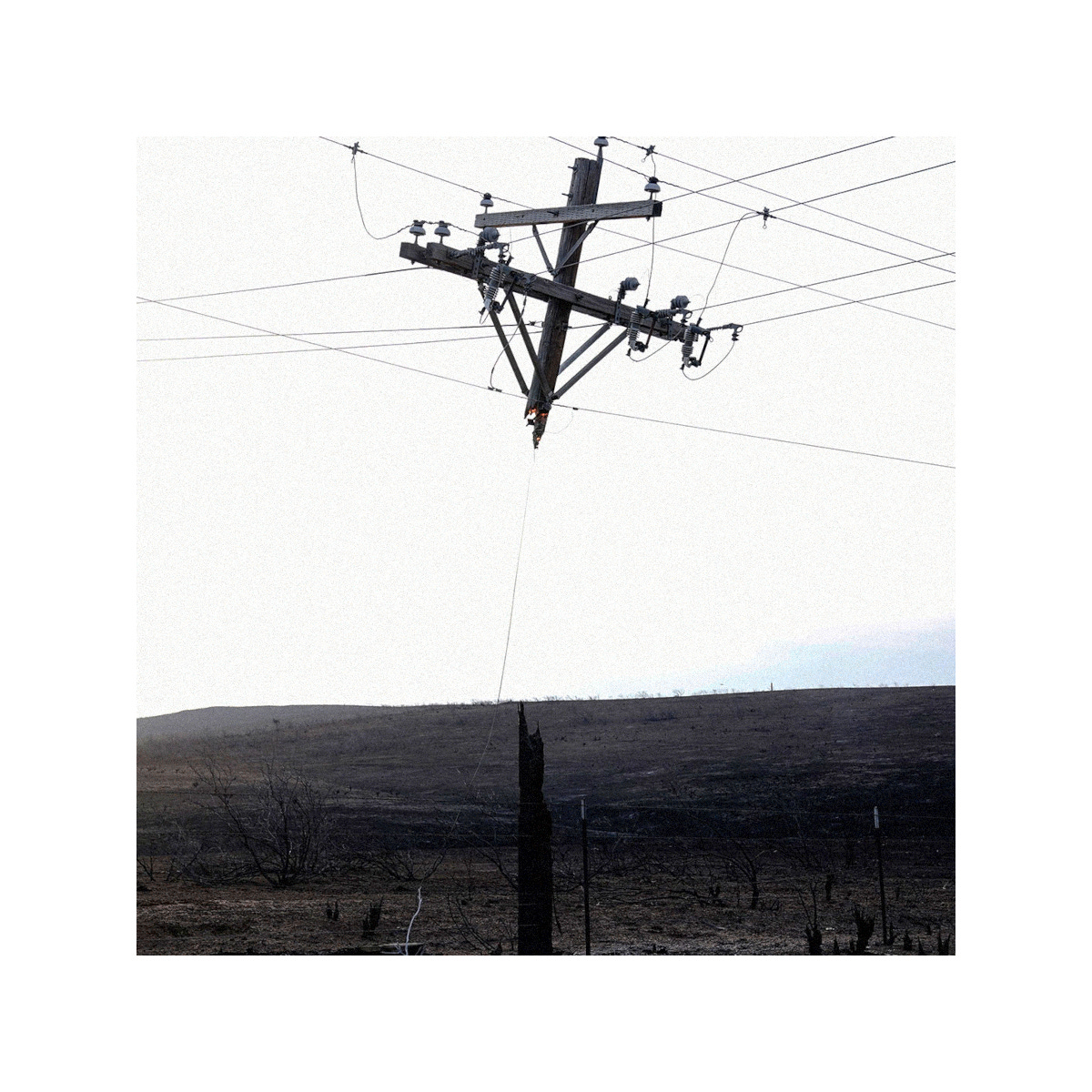In August 2023, Georgia’s Attorney General filed an indictment in Atlanta which named 61 individuals. The indicted are alleged to have conspired to violate Georgia’s RICO law through their participation in Stop Cop City. Stop Cop City, also known as Defend the Atlanta Forest, is a broad movement that opposes a new, state of the art police training center under construction in Atlanta. Plans to build the training facility, dubbed “Cop City,” were approved back in 2021. The training facility faced fierce opposition from the start, in turn eliciting fierce repression from the state. In 2022, officials began charging movement participants under Georgia’s domestic terrorism law. 2023 saw the police murder of Tortuguita, a Stop Cop City activist. This was followed by more domestic terrorism charges, felony charges for flyering a neighborhood, allegations of financial crimes, and most recently, the RICO indictment.
Here, Brad Thomson, a civil rights and criminal defense lawyer at People’s Law Office in Chicago, discusses RICO and the Stop Cop City case with Morgan and Brooke, an activist and a researcher. After clarifying the nature of RICO, they explain how it is being deployed against a broad social movement to discourage participation, in addition to targeting specific actors. They situate the indictment in a historical context of movement repression, link it to an overall strategy to neutralize Stop Cop City, emphasize the significance of Stop Cop City for opposing proposed police training facilities across the country, and provide an assessment of the movement’s resilience against repression.
Can you please explain what RICO is and how it is being applied against the 61 individuals named in the indictment?
Thomson: RICO is the “Racketeer Influenced Corrupt Organizations Act.” It was passed at a federal level in 1970, ostensibly to target the Mafia. Previously, the government could only charge individuals for specific crimes and the government believed that the structure of criminal organizations allowed participants, particularly ones in leadership positions, to escape liability. RICO provided additional tools and sentences to the government for them to prosecute people for their actions being connected to a larger “criminal enterprise.”
Many states, including Georgia, have enacted their own RICO laws at the state level. While there are nuances and distinctions that are important from a legal perspective, the overall nature of the laws is similar. The government can identify what it considers a “criminal enterprise” or “racketeering conspiracy” and charge people for actions allegedly connected to the criminal organization. The prosecution has a lot of power in how they define an enterprise and what actions they claim are furthering that organization or enterprise.
What is particularly egregious about this prosecution is that the “enterprise” or “conspiracy” being targeted isn’t a criminal organization—it is a broad social movement. Essentially, the State is charging people for their connection to the movement against Cop City. While some of the “overt acts” allege property destruction or other crimes, much of the indictment is based on First Amendment protected activity.
As you mention, Stop Cop City is a broad movement. Social movements by their very nature are larger, broader, and more heterogenous than an “organization” or “enterprise.” By alleging a RICO conspiracy, the State is attempting to apply a legal framework that simply should not apply to a social movement like this.
Morgan: RICO, the Racketeer-Influenced Corrupt Organizations Act, is a law that criminalizes participation within criminal organizations. Historically, RICO has been used to charge the leaders of criminal organizations for their involvement in a criminal enterprise even when they themselves have not directly committed the bulk of the crimes. Think about mob bosses. They do not themselves commit the majority of crimes within their organization,so it was difficult for the state to crack down on these cases. That is, until the federal government passed RICO in 1970. With RICO, the state has been able to pursue charges against “leaders” of organized crime, famously including the Gambinos, Hells Angels, and the Cowboy Mafia.
That’s RICO at the federal level. What is happening with the Cop City 61 is that they are being charged with Georgia’s state RICO statute. The Georgia statute is much more vague and has the possibility of casting a much wider net than the federal statute.
With this in mind, the current RICO indictment argues that the 61 codefendants are a part of a criminal enterprise called “Defend the Atlanta Forest” which is committed to violent anarchist ideas and “direct action” to prevent the construction of Cop City. The indictment reads like a poorly written book report on philosophical anarchism, complete with allusions to anarchy’s founding father, Mikhail Bakunin, and expositions on its main tenets (collectivism, mutualism/mutual aid, and social solidarity).
Obviously, this raises major red flags for anyone concerned with our rights to protest in the United States. What is being charged is anarchism itself. As a result, anyone holding anarchist beliefs or participating within social movements which the state deems anarchist can be charged with RICO if any crimes are committed, regardless of personal culpability. The implications for anyone concerned with creating a more free and just society should be horrified by the Cop City RICO case.
Brooke: We should also clarify that, legally, a conspiracy is not an enterprise. It is an agreement to commit a crime. With RICO, a conspiracy is an agreement to violate the RICO statute. A violation of the RICO statute occurs when one participates in an enterprise through a “pattern of racketeering activity.” So, the issue in a Georgia RICO case is not really whether there is a criminal enterprise. Rather, it is whether one participated in (or in the case of a RICO conspiracy, agreed to participate in) an enterprise criminally. Here, the issue is not whether Defend the Atlanta Forest is a criminal enterprise. Instead, it is whether the defendants agreed to participate criminally in Defend the Atlanta Forest. (Obviously, this assumes that a social movement can be properly understood as an enterprise, a suspect claim itself.) While the Cop City RICO indictment tries to characterize Defend the Atlanta Forest as a criminal enterprise, this misses the point. Instead, what the Attorney General needed to have alleged (but did not) were facts indicating that the defendants agreed to participate in Defend the Atlanta Forest (the “enterprise”) through a pattern of criminal (“racketeering”) activity.
In Georgia, RICO conspiracies require an “overt act” in furtherance of the conspiracy. This is in addition to the requirement of an agreement to participate in the enterprise through a pattern of racketeering activity. The indictment lists numerous “overt acts” alleged to be “in furtherance of the conspiracy.” But again, the indictment does not clearly set forth facts indicating the existence of any agreement. Without an agreement, it is unclear how the “overt acts” listed in the indictment can be in the furtherance of any conspiracy.
Repression against Stop Cop City escalated in late 2022. In December, the state began labeling and charging movement participants as domestic terrorists. This continued into 2023. Today, over 40 individuals face charges under Georgia’s domestic terrorism law. In addition, the state has charged some with financial crimes and others with felonies for flyering neighborhoods. These individuals are named in the RICO indictment. Given the existing charges already imposed, why is the state using RICO against these same individuals?
Thomson: Identifying individuals as “terrorists” is a rhetorical tool the state uses to discredit and dismiss legitimate political dissent. We have seen the state utilize this language and implement terrorism charges as a way to repress resistance movements throughout history, particularly after 9/11. In the early 2000s, we saw many prosecutions of Palestinian and Arab Americans who were opposed to the policies of the US or Israel. We also saw the Green Scare where environmentalists and animal rights activists were prosecuted and sentenced as “terrorists.” Simply charging people with “terrorism” is part of a strategy to repress not only those individuals, but the movements they are active in.
There are domestic terrorism charges still pending in DeKalb County and it remains to be seen what, if anything, the state intends to do with those charges. The RICO indictment in Fulton County also charges some individuals with “domestic terrorism.”
Why specifically the state chose to prosecute these individuals in this particular way is not something I can answer. But labeling movement participants as “terrorists” and branding the movement itself as a “criminal enterprise” certainly provides the state with certain political and legal weapons that they are implementing against activists, organizers, and movement participants.
Morgan: To be honest, I am unsure why the state is choosing to move forward with RICO as opposed to the specific charges many of the codefendants are already facing. My best guess is that the prosecutor has a lot of pressure being placed on his office to produce charges to stop the movement, especially given the extensive use of arson against construction equipment and the unrelenting opposition from many segments of the movement. It is clear that the campaign has worked to radically slow construction. I imagine that the project has been hovering near the breaking point for months, despite whatever confidence the state has tried to project. A RICO indictment signifies to the contractors and the Atlanta Police Foundation, the funder of Cop City, that the “organization” has been found and that the crimes and sabotage will be stopped. Of course, nothing of the sort has happened. By my crude estimations, about half of the property destruction has occurred since the RICO indictment dropped. This points to two facts. First, there is no such organization pulling the strings behind the curtain. The movement is powerful in that it has brought many different actors together in common opposition to Cop City and the RICO codefendants are each caught in the state’s dragnet operation. Second, the repression has been unsuccessful at deterring action across the tactical spectrum of the movement. Peaceful protests continue alongside arsons. Both sides will need to continue moving forward.
Brooke: It’s important to remember that the Dekalb County District Attorney chose to withdraw from prosecuting the domestic terrorism cases. In doing so, she noted “fundamental differences in prosecutorial philosophy” with Georgia’s Attorney General. A reasonable inference is that she believes these cases are weak and unwinnable. Many of those indicted under RICO have prior domestic terrorism charges, as you said. So one theory is that the RICO indictment serves, among other things, to compensate for the weakness of the domestic terrorism cases.
Also, Georgia’s RICO statute includes any act of domestic terrorism within a “pattern of racketeering activity.” Many of the indicted are alleged to have aided and abetted or committed domestic terrorism. The Attorney General may be using these allegations to help establish his RICO case, even if they are weak and unlikely to themselves result in convictions.
Last, the crime of conspiracy offers prosecutors certain advantages that disfavor the defense. Because the Cop City defendants have been charged under the RICO conspiracy provision, the Attorney General has certain advantages in this case. These include somewhat looser standards for admitting evidence and the permissibility of using one defendant’s statements against another. Under different circumstances, the latter use of statements would not be allowed. In addition, under general conspiracy principles, if just one conspirator is found to have committed an “overt act,” all coconspirators may be criminally liable. This is concerning because violating Georgia’s RICO law can result in a hefty penalty (potentially a 20 year sentence). Of course, this is a reason why RICO is appealing to the state, and why the Attorney General might be using RICO against Stop Cop City.
Is there any precedent of RICO being used against social movements, either by the federal or state governments? Is the RICO indictment in Atlanta an innovation in social movement repression?
Thomson: There have been RICO indictments used against radical social movements at other points throughout history. For example, I represented Mutulu Shakur in the fight for his freedom after 36 years in prison. He had been convicted under the federal RICO law for his involvement in the fight for Black liberation in the late 1970s and early 1980s, which included the liberation of Assata Shakur.
Conspiracy laws are a common tool for prosecutors, including prosecutions of political activists. What is particularly dangerous about conspiracy charges is that they criminalize relationships and associations, which are at the core of social movements.
Having said that, the RICO indictment does seem to be expanding and intensifying some of these tactics we’ve seen previously. In particular, the charges against movement infrastructure and support, such as the Atlanta Solidarity Fund and legal observers, is not something we’ve typically seen in RICO cases. 61 people is also a particularly large number of people to be charged as part of the same RICO case.
Morgan: RICO has a history of being used against activists. I think it is best to think of RICO as the current manifestation of prosecuting political “conspiracies” more generally. We should consider, for example, the Red Scare, McCarthyism, the Chicago 7 (charged with conspiracy and inciting a riot at the 1968 DNC in Chicago), the war against Puerto Rican independence activists, the Black Liberation Movement, Animal and Earth Liberation groups, and now Cop City as part of an enduring lineage of the state’s war against the Left.
In this way, I think we can think of RICO as the cutting edge of repression in Georgia. The statute is a state law, and it is part of a more recent wave of RICO in Georgia (the others being the Trump RICO case and the Yung Thug/YSL RICO case). We need to also consider the fact that not only is Georgia pursuing a wildly unconstitutional RICO case against the Left but also pursuing other legislative avenues to outlaw the Stop Cop City movement.
The RICO conspiracy alleged in the indictment asserts that it began on May 25, 2020. That is the day Derek Chauvin, formerly of the Minneapolis Police Department, murdered George Floyd. Chauvin’s murder of Floyd sparked a fierce, worldwide uprising against the police. But May 25, 2020 predates Cop City, which was approved in 2021. What is the significance of the Attorney General’s assertion that the RICO conspiracy began on this day?
Thomson: The summer of 2020 saw some of the largest protests against white supremacy and state violence that this country has ever seen, along with some of the loudest calls for abolition of the police and prisons. This is clearly something that the state is opposed to and sought to repress at the time. By backdating the “conspiracy” to include the protests and actions in 2020, the state is clearly trying to criminalize the broader movement against police violence and anti-Blackness.
Morgan: The state is trying to argue that a conspiracy against the police began during the George Floyd uprising. This is not surprising, really. There was a militant movement that was attempting to directly contest the power of the police state which involved many tens of thousands in Atlanta and many millions more across the country. It is true. The movement against Cop City is an extension of this movement insofar as Cop City represents the state’s continued commitment to building a police state while the movement is the continuation of the war against that reality. It is actually funny. People protest the police and the state responds with the further militarization through the Cop Cities. The state’s goal is to destroy this movement root-and-branch. It thinks it can do that by drawing its narrative arc to the supposed source, while the “conspiracy” they seek to prove exists is essentially anyone who participated in this movement.
The criminalization of anti-police movements is becoming necessary to stop a broad based social movement which has been fiercely contesting power for four years. Rather than being a momentary rupture, the George Floyd Rebellion, nurtured by the legacy of rebellion preceding it, gave birth to an avant-garde movement. This movement wants to see the revolutionary transformation of the United States and the dismantling of police power by any means necessary.
The reaction against Stop Cop City has also targeted movement infrastructure. Recently, state legislation in Georgia has criminalized charitable bail funds. Bail funds have been crucial for freeing persons jailed for opposing Stop Cop City. Can you comment on the targeting of bail funds as part of the strategy against Stop Cop City?
Thomson: In the indictment, the state makes a point of identifying the concepts of “mutual aid” and “solidarity,” which exposes that they are criminalizing people based on political belief and ideology. This new law is clearly a direct attack on organizations like Atlanta Solidarity Fund who have put the principles of mutual aid and solidarity into practice in a principled way.
It’s also important to recognize a larger context where bail funds have had a profound impact in recent years in protecting the constitutional rights of and improving the quality of life for people facing trial throughout the country. The communities who have most benefitted from this have been poor and working-class people who would not have otherwise been able to afford bail. Due to the white supremacy within the criminal legal system, the majority of people in this position are Black and other people of color.
This new bill in Georgia, and similar legislation that has been proposed in other states, is not only an attack on the movement infrastructure, it is also an attack on progressive reforms that have mitigated against the racism and classism inherent in the criminal legal system.
Morgan: This is a war for the future of our society, and the state has dug its heels in all the way in favor of the current order. The criminalization of bail funds is a move to specifically outlaw the Atlanta Solidarity Fund. In addition, legislation has been introduced to expand the state’s anti-terrorism laws, though at this time it’s unclear to me what that will mean for the movement. Either way, we can probably be confident that Georgia’s repressive apparatuses are only in the process of ramping up, and where this thing is headed remains anybody’s guess. They will continue to escalate their violence until the movement subsides or the movement is victorious.
Really, what we need to understand is this: repression is the natural outcome of resistance. If our movements fight fiercely for a more just world, the current organization of power will do whatever it can to prevent this transformation. At first it will appear as police overstepping their authority and of politicians ignoring the popular mandate. But as the rupture deepens, a social movement with revolutionary aspirations will provoke increasingly flagrant violations of the constitutional order, and the liberal state reveals its fascist underbelly. This is happening right now in Georgia. But we should expect this entirely. Are we prepared to deal with the reaction? Can we withstand the repression? Will our movement continue to grow despite the suffering the state will inflict upon us? Or will we shrink back into quiescence and inactivity? These are the real questions.
New police training centers like the one contested in Atlanta have been built and proposed across the US in the past few years. Centers have been proposed in California, Indiana, Kansas, Kentucky, Nevada, and many more. Can you comment on the importance of the unfolding situation in Atlanta for opposing the construction of these other training facilities across the US and the future repression of social movements?
Thomson: The state response to the Black Lives Matter movement has included embracing calls for “more training” as a way to co-opt or redirect the movement in order to obtain more funding, more resources, and more staffing for police departments under the guise of “training” and “reform.” These training centers are a way to increase the power of police and should be opposed across the country.
The movement against Cop City has emphasized that it is not just a fight that is local to Atlanta, but that it has an impact throughout the country and throughout the world. That is evidenced by all the similar centers proposed throughout the country.
Morgan: Given that the social movement is far less organized than the state at the present moment, I think it would behoove the movement to focus on defeating the Cop City in Atlanta. By provoking a major political crisis in Atlanta, the movement has created the conditions for social forces elsewhere (i.e. Democrats, progressive city council members in other states, “civil society” more broadly) to organize to oppose the construction of other cop cities. For instance, there was just a major victory in Fitchburg, a suburb of Madison Wisconsin. There, the city council rejected a proposal for a new police training facility. At the same time, I hope the movement can avoid a “wack-a-mole” or “not-in-my-backyard” mentality, and instead set its eyes on the prize: creating a revolutionary movement that can depose the police state (and break the back of the military, socialize the means of production, etc.).
As I said before, this all hinges on a nonliberal conception of repression. For liberals, repression appears as the system going haywire and not working properly. This leads people to invoke the framework of rights (and their violation) to understand the state’s actions. Of course, the state and the law are arenas for struggle. We should push for an expansion of our rights and push back against their abuses. At the same time, the system and the ruling class will defend itself and become increasingly flagrant in its abuses when necessary.
How successful has the repression against Stop Cop City been? How is it being resisted?
Thomson: One of the dangerous aspects of state repression is the chilling effect. People who are sympathetic to the cause see arrests, trumped up charges, house raids, and police violence. In response, they fear that it might happen to them and choose not to be involved, or to limit their participation in the movement. It’s hard to know exactly how many people are in that position or how people would be engaged if it were not for the state’s actions.
Having said that, the resilience and commitment of the movement against Cop City has been remarkable. Despite the state’s efforts, people have continued the fight on all fronts. From public demonstrations, the referendum campaign, people chaining themselves to construction equipment, to anonymous underground actions, the broad and diverse movement has continued to oppose Cop City.
Morgan: The success or failure of the repression against Stop Cop City is yet to be determined. At the present, there are protests against Nationwide (the insurer of Cop City) in Tucson, Arizona. Since the RICO indictment dropped, there have been dozens of arsons and other attacks on Cop City and its backers. So, it would appear that the movement has not been squashed from the repression. At the same time, it does seem that the repression has raised the bar for participants. If you are not a hardcore abolitionist, would you hesitate before joining a protest if you thought it was possible that you would get arrested and charged with racketeering? I think that is very likely. So it seems the task is to create new avenues for mass participation while supporting the clandestine and underground movement as it engages in direct action against the project.
How can the repression against Stop Cop City inform our organizing and anti-repression work? Are there any lessons for us?
There are similar lessons for any type of state repression: Don’t take the state’s allegations at face value—especially when they are attempting to discredit activists as “terrorists.” Provide support to fellow movement participants who are facing repression.
Be smart and be strategic. It’s important to be cautious, but don’t let fear stop you from advocacy or taking bold action. Practice good security culture and organize with people you trust and share affinity with, while maintaining principled solidarity with the larger movement.
All successful movements face some level of repression. It’s critical to address the repression and respond accordingly, but to never give up the fight against oppression, white supremacy, and the destruction of our world.
There are many lessons to be learned from the fight against Cop City, particularly the importance of solidarity within the movement and an acknowledgment that successful movements embrace a diversity of participants and a diversity of tactics.
This text has been syndicated from Inhabit: Territories.





